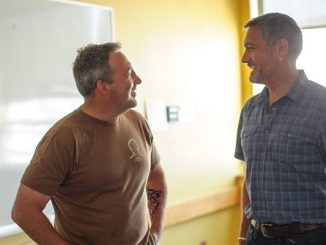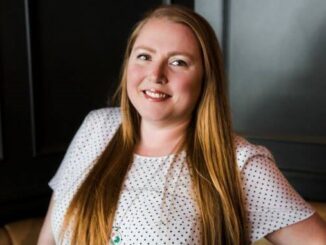The Stigma-Free Society is committed to combatting stigma of all kinds, including both those imposed by others and the ones that people internalize themselves. We recently spoke with Andrea Paquette of the Society to find out more about the charity.

Describe your charity/non-profit in a few sentences.
The Stigma-Free Society builds inclusive and compassionate communities, based on the core message that truly, “No matter what our challenges, we can all live extraordinary lives.” This is a vision that I, as the Co-Founder & President of the Society, have been sharing since about 2010, when I began to talk about my own stories of struggle and triumph regarding mental health. In 2015, I received the Courage to Come Back award from Coast Mental Health. That’s when I met Dave Richardson, and together we set out to create Stigma-Free zones: safe spaces without discriminatory biases, where no one is judged or blamed. While we focus on mental wellness, we agreed that our efforts were part of a broader movement of overcoming the various stigmas that people face. We feel our name reflects our overall purpose of encouraging awareness, understanding, and acceptance.
What problem does it aim to solve?
The Stigma-Free Society is committed to combatting stigma of all kinds, including both those imposed by others and the ones that people internalize themselves. One of the main ways that we aim to overcome stigma through the power of sharing personal stories. These stories of both challenges and successes help others relate to the issue. Hearing from another human being helps us reconnect with our humanity. My hope is that sharing these stories will mean that other people won’t have to suffer in silence, like I did.
When did you start the SFS?
The society finds its roots in the Bipolar Babe Project, my brainchild from 2009. I designed a T-shirt and created an impactful website that offered people a place to connect and find valuable mental health information. In 2010, the Bipolar Babe Project evolved into the Bipolar Disorder Society of BC in 2010, with the collaboration of seven dedicated Board of Directors. Our vision and mission continued to expand, and we changed our name to the Stigma-Free Society in 2016.
What made you want to get involved?
I remember finding my vision and passion for this project the first time that I was asked to speak in front of a large crowd (500 people). Scared, shaking, and red-faced, I looked around at all of these people and said something like, “Hi everybody, my name is Andrea. I have bipolar disorder, but I’m not bipolar disorder. I’ve learned that I have a mental illness, but I am not defined by that illness, and I can live an amazing life.” In that moment, I knew that the stigma had been shattered. This was the moment that I realized it was time for me to come out, so to speak, and just be okay with having bipolar disorder.
It can be traumatic for people to hear the details about my story, including my suicide attempt, but I say that the real issue is that we do not talk about these issues enough. It’s still quite taboo in this society, and this taboo made it very hard for me to reach out when I was struggling. I didn’t talk to anyone. I wasn’t alone, but I felt very alone. That’s why it’s so important to me to be a change-maker. We need to remember there is always help and there is always hope.
What was the situation like when you started?
Mental health and wellness were topics that simply weren’t talked about. I was one of many people who had been suffering in silence. People who struggled with their mental health were not reaching out to family or friends or doctors, and there were very few if any community resources.
How has it changed since?
Over the past decade, I’ve sensed a growing awareness and understanding of mental health challenges. When I started sharing my personal story of living with bipolar disorder, many people were shocked that I would put myself out there like that. It was jaw-dropping for them to witness, and it was very challenging for me to do. But I’ve increasingly seen a surge in mental health advocates and speakers, especially over the past five years. People are becoming empowered to own their truth, and I love to see people excited to shout their reality from the rooftops, in hopes of making a difference.
What more needs to be done?
There is still a lot of work to do in this field. Fighting stigma is an ongoing challenge. We need to push for more access to mental health services and care for more people.
How can our readers help?
The more people reach out for help, the more we can work to eliminate stigma. I want our readers to know that mental illness is not something to be feared—it’s something to be treated. No matter how bad the crisis, there is help and hope in all situations. I myself am grateful to have eventually found continued stability. I think it’s important for our readers to remember that anyone can have a mental health issue. I believe that mental health challenges are even more common than that 1/5 statistic we usually hear. Even if you yourself are not personally affected with a mental health issue, it’s very likely to happen to someone you love or care about. By sharing stories about mental health, we can ignite education on this important topic, which will eventually lead us to shed the stigma that so often clouds our truth. I encourage our readers to share because doing so may help to shine a light where others have seen only darkness.
Do you have any events coming up?
One of the initiatives that I’m most excited about is that we’re increasing accessibility to our Student Mental Health Toolkit and Virtua Stigma-Free Presentations program. Targeted towards students grades 4-7 and 8-12 and aligned with the BC curriculum, these resources are designed for teachers, school counsellors, students, and parents/guardians to use on topics such as mental health, stigma, diverse-ability, and more!
To keep up with Stigma-Free Society, please subscribe and support our YouTube channel, which houses all of our Mental Wellness Live events as recorded videos. We feature wellness chats, advice for parents and caregivers, and more: there’s something for everyone! Our channel is updated weekly with new videos, and we’re so excited to share knowledge and information from experts and advocates all across North America!
Where can we follow you?
Website | Facebook | Twitter | Instagram | YouTube
PAY IT FORWARD: What is an awesome local charity that you love?
Two awesome local charities are Autism BC and Together We Can! Please check out the links to find out how you can support.



